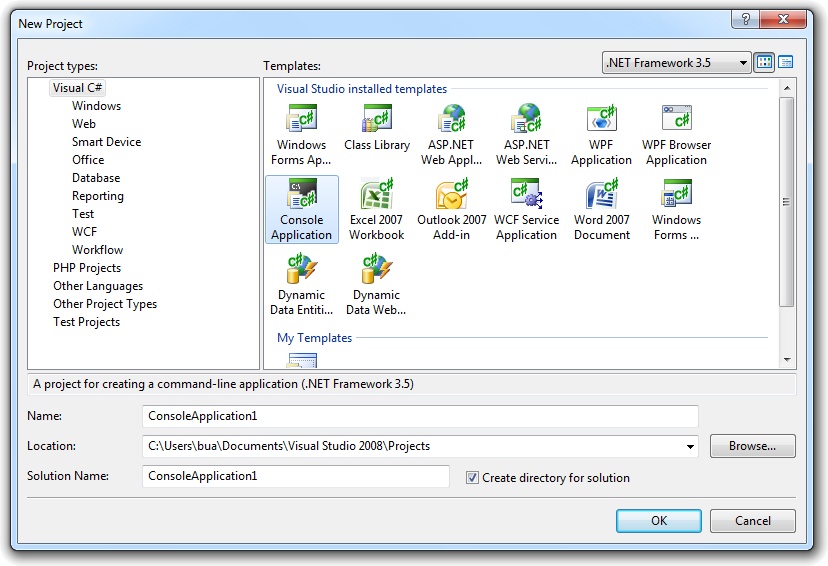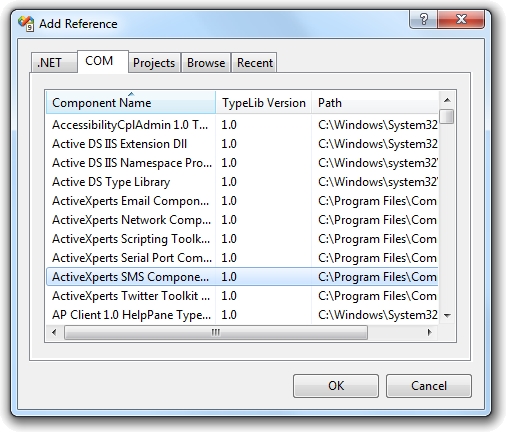Visual Basic .NET SNMP Sample Source Code
Network Component provides an easy-to-use development interface to a variety of IP protocols. By using Network Component, you can very easily create or enhance applications with network features.
Network Component features the following: DNS, FTP, HTTP, HTTPs, ICMP Ping, IP-to-Country, MSN, NTP, RSH, SCP, SFTP, SNMP v1/v2c (Get, GetNext, Set), SNMP Traps, SNMP MIB, SSH, TCP, Telnet, TFTP, UDP, Telnet, Wake-On-LAN and more.
Network Component can be well integrated into any development platform that supports ActiveX objects.
SNMP can be well integrated into ASP .NET (Visual Basic) environments.
This document describes how Network Component's SNMP objects can be integrated into ASP .NET (Visual Basic) projects.
Network Component is compliant with SNMP v1 and SNMP v2c. Different SNMP data types are supported, including:
- String types (also called "octet strings");
- Integer types (16bit, 32bit, 64bit and unsigned integers);
- IP Address types;
- Timetick types;
- Counter types (32bit and 64bit counters);
- OID types (also called "Object ID's");
- Other, less frequently used datatypes.
The following operations are supported:
- Get - retrieve an object variable from the (remote) agent;
- GetNext - retrieve the next object variable from a table or list within an agent;
- Set - set values for object variables within an agent.
Step 1: Download and install the Network Component
Download Network Component from the ActiveXperts Download Site and start the installation. The installation guides you through the installation process.
Step 2: Create a new Visual Basic .NET Project
Launch Microsoft Visual Studio (for instance 'Microsoft Visual Studio 2008') from the Start menu. Choose 'New' from the 'File' menu and click on 'Project'. In the 'New Project' dialog, select a Visual Studio template (for instance: 'Console Application'). Select a name for the application (for instance: 'DemoApp') and a name for the solution (for instance: 'DemoSolution'). Also, select the directory where you want to store the project (for instance: 'C:\MyProjects):
Step 3: Refer to the Network Component Library and create the objects
Now that a new project has been created, you must add a reference to the Network Component in the project to be able to use the the Network Component object. To do so, choose 'Add Reference...' from the 'Project' menu. In the 'Add Reference' dialog that pops up, select the 'COM' tab and select the 'Network Component 4.4 Type Library' as shown in the following picture:
Click 'OK' to close the 'Add Reference' dialog.
On top of your code, type the following line to use the Network Component namespace:
Imports AxNetwork
In your Main function, declare and create the following object:
Public objSnmp As SNMP objSnmp = New Snmp()
Appendix: Full source code
Imports System.IO
Imports AxNetwork
Module SnmpProgram
Private g_objConstants As NwConstants
Sub Main()
Dim objSnmpManager As AxNetwork.SnmpManager = New AxNetwork.SnmpManager
Dim objSnmpObject As AxNetwork.SnmpObject
Dim strHostName As String = ""
Dim strCommunity As String = ""
Dim strMibFile As String = ""
Dim strOID As String = ""
' A license key is required to unlock this component after the trial period has expired.
' Call 'Activate' with a valid license key as its first parameter. Second parameter determines whether to save the license key permanently
' to the registry (True, so you need to call Activate only once), or not to store the key permanently (False, so you need to call Activate
' every time the component is created). For details, see manual, chapter "Product Activation".
'
' objSnmpManager.Activate("XXXXX-XXXXX-XXXXX", False)
' Display component information
Console.WriteLine("ActiveXperts Network Component {0}{1}Build: {2}{3}Module: {4}{5}License Status: {6}{7}License Key: {8}{9}", objSnmpManager.Version, Environment.NewLine, objSnmpManager.Build, Environment.NewLine, objSnmpManager.Module, Environment.NewLine, objSnmpManager.LicenseStatus, Environment.NewLine, objSnmpManager.LicenseKey, Environment.NewLine)
' Set Logfile (optional, for debugging purposes)
objSnmpManager.LogFile = Path.GetTempPath() + "Snmp.log"
Console.WriteLine("Log file used: {0}{1}", objSnmpManager.LogFile, Environment.NewLine)
g_objConstants = New NwConstants
strHostName = ReadInput("Enter SNMP (remote) host (leave blank to use 'localhost'):", "localhost")
strCommunity = ReadInput("Enter community (leave blank to use 'public'):", "public")
strMibFile = ReadInput("Enter MIB file (optional):", "")
Console.WriteLine("Agent: " & strHostName)
Console.WriteLine("Community: " & strCommunity)
Console.WriteLine("MIB file: " & strMibFile)
' To enable logging, assign a valid log file to the LogFile property
' objSnmpManager.LogFile = "C:\SnmpManagerDemo.log"
' Set protocol version
objSnmpManager.ProtocolVersion = g_objConstants.nwSNMP_VERSION_V2C
' SNMP Initialize
objSnmpManager.Initialize()
Console.WriteLine("Initialize, result: " & objSnmpManager.LastError.ToString() & " (" & objSnmpManager.GetErrorDescription(objSnmpManager.LastError) & ")")
If (objSnmpManager.LastError <> 0) Then
System.Threading.Thread.Sleep(5000) ' Sleep for 5 seconds before exit
Exit Sub
End If
If (strMibFile <> "") Then
objSnmpManager.LoadMibFile(strMibFile)
End If
' SNMP session. Pass hostname and community.
objSnmpManager.Open(strHostName, strCommunity, 161)
Console.WriteLine("Open, result: " & objSnmpManager.LastError.ToString() & " (" & objSnmpManager.GetErrorDescription(objSnmpManager.LastError) & ")")
If (objSnmpManager.LastError = 0) Then
strOID = "system.sysName.0"
objSnmpObject = objSnmpManager.Get(strOID)
If (objSnmpManager.LastError <> 0) Then
Console.WriteLine("Get, result: " & objSnmpManager.LastError.ToString() & " (" & objSnmpManager.GetErrorDescription(objSnmpManager.LastError) & ")")
Else
While (objSnmpManager.LastError = 0)
PrintSnmpObject(objSnmpObject)
objSnmpObject = objSnmpManager.GetNext()
End While
objSnmpManager.Close()
Console.WriteLine("Close, result: " & objSnmpManager.LastError.ToString() & " (" & objSnmpManager.GetErrorDescription(objSnmpManager.LastError) & ")")
End If
End If
objSnmpManager.Shutdown()
Console.WriteLine("Shutdown, result: " & objSnmpManager.LastError.ToString() & " (" & objSnmpManager.GetErrorDescription(objSnmpManager.LastError) & ")")
Console.WriteLine("Ready.")
System.Threading.Thread.Sleep(5000) ' Sleep for 5 seconds before exit
End Sub
Private Function ReadInput(ByVal strTitle As String, ByVal strDefault As String) As String
Dim strInput As String = ""
Console.WriteLine(strTitle)
Console.Write(" > ")
strInput = Console.ReadLine()
If (strInput = "") Then
strInput = strDefault
End If
ReadInput = strInput
End Function
Private Sub PrintSnmpObject(ByVal objSnmpObject As SnmpObject)
Console.WriteLine("OID : " + objSnmpObject.OID)
Console.WriteLine(" Name : " + objSnmpObject.OIDName)
Console.WriteLine(" Value : " + objSnmpObject.Value)
Console.WriteLine(" Type : " + GetTypeString(objSnmpObject.Type))
End Sub
Private Function GetTypeString(ByVal numType As Int32) As String
Dim strType As String = ""
Select Case numType
Case g_objConstants.nwSNMP_TYPE_INTEGER32
GetTypeString = "nwSNMP_TYPE_INTEGER32"
Case g_objConstants.nwSNMP_TYPE_BITS
GetTypeString = "nwSNMP_TYPE_BITS"
Case g_objConstants.nwSNMP_TYPE_OCTETSTRING
GetTypeString = "nwSNMP_TYPE_OCTETSTRING"
Case g_objConstants.nwSNMP_TYPE_NULL
GetTypeString = "nwSNMP_TYPE_NULL"
Case g_objConstants.nwSNMP_TYPE_OBJECTIDENTIFIER
GetTypeString = "nwSNMP_TYPE_OBJECTIDENTIFIER"
Case g_objConstants.nwSNMP_TYPE_SEQUENCE
GetTypeString = "nwSNMP_TYPE_SEQUENCE"
Case g_objConstants.nwSNMP_TYPE_IPADDRESS
GetTypeString = "nwSNMP_TYPE_IPADDRESS"
Case g_objConstants.nwSNMP_TYPE_COUNTER32
GetTypeString = "nwSNMP_TYPE_COUNTER32"
Case g_objConstants.nwSNMP_TYPE_GAUGE32
GetTypeString = "nwSNMP_TYPE_GAUGE32"
Case g_objConstants.nwSNMP_TYPE_TIMETICKS
GetTypeString = "nwSNMP_TYPE_TIMETICKS"
Case g_objConstants.nwSNMP_TYPE_OPAQUE
GetTypeString = "nwSNMP_TYPE_OPAQUE"
Case g_objConstants.nwSNMP_TYPE_COUNTER64
GetTypeString = "nwSNMP_TYPE_COUNTER64"
Case g_objConstants.nwSNMP_TYPE_UNSIGNED32
GetTypeString = "nwSNMP_TYPE_UNSIGNED32"
Case Else
GetTypeString = "UNKNOWN"
End Select
End Function
End Module
You can download the complete samples here. There are many other working Network Component scripts on our site and shipped with the product.
NOTE: Demo Projects are created with Microsoft Visual Studio 2008
The Network Component project ships with a set of Microsoft Visual Studio .NET samples, including samples for Microsoft Visual C# .NET. The projects are created with Microsoft Visual Studio 2008.
Users with a later version of Microsoft Visual Studio can open such a project. The Visual Studio Conversion Wizard will guide you through the process of converting the project to the version used.


